Honoring the Legacy of Urban Design Pioneer Jaqueline Tyrwhitt
The GSD renamed the 50th Anniversary of Urban Design Program Lecture for Jaqueline Tyrwhitt, a GSD associate professor who worked to establish and fortify the urban design program during its founding years. The Jaqueline Tyrwhitt Urban Design Lecture will be delivered each year by a visionary urban planner, designer, scholar, or leader who has opened novel directions in urban-design thinking and traced new intersections between urban design and other disciplines. Moshe Safdie, Lee Cott (MAUD ’70), and Jay Chatterjee (MAUD ’65) played a key role in establishing the original lecture in 2010 and fortifying its energy since.
About Professor Jaqueline Tyrwhitt
Written by Sarah M. Whiting, Dean and Josep Lluís Sert Professor of Architecture
Professor Tyrwhitt (1905–1983) served as an Associate Professor at the GSD between 1955 and 1969, and worked to establish and fortify the urban design program during its founding years. Professor Tyrwhitt—or Jacky, as she preferred to be called by friends—spent her early years in London and the English countryside. While taking a course at the Architectural Association, she found inspiration in the work of Patrick Geddes and his view of urban planning as organic rather than predetermined; her study and illumination of Geddes’s ideas would later prove seminal. After World War II, Tyrwhitt would stake out a transformative role in shaping the post-war Modern Movement toward decentralized urban, community, and residential design. She left England for Canada in 1951, working to establish a graduate program in city and regional planning at the University of Toronto. She arrived at the GSD in 1955, teaching here until her retirement in 1969.
Central forces throughout Professor Tyrwhitt’s pedagogy include her humanistic approach to urban planning and design, and her commitment to communicating and sharing design discourse. She translated and edited all major works by Swiss art historian Sigfried Giedion, and in 1955 launched a journal titled Ekistics to activate the influence of Greek architect and planner Constantinos Doxiadis. She moved to Greece after her GSD retirement, settling on an Attic hillside near the village of Peania; she passed away there in 1983, working on her final book. Our Frances Loeb Library offers a number of Professor Tyrwhitt’s publications; additionally, she was a focus of the library’s 2018 exhibition “Feminine Power and the Making of Modern Architectural History.”
Department of Landscape Architecture Announces 2022 Penny White Project Fund Recipients
The Harvard Graduate School of Design’s Department of Landscape Architecture has announced the 2022 recipients of the Penny White Project Fund . Established in 1976 by the family of Winifred G. “Penny” White who died suddenly during her second year as a landscape architecture student at the GSD, the program offers financial support for student projects with the goal to “carry forward Penny’s ideal of a culture which emphasizes a close relationship between people and nature in a cohesive living environment.”
This year’s 18 winning proposals were selected through an evaluation process that looked for “originality and innovation of projects, with an eye to their contribution to pressing challenges related to the fields of design, landscape, urbanism, and ecology.” Awards typically range from $200 to $4,500.
“From the impact of animist relationships with plants in the cultivation of ecosystems in Hawai’i to the analysis of rest stops and their impact in the US highway culture and leisure travel, from the role of the Luganda language in the construction and preservation of landscapes in south central Uganda to the shared cultural values and practices in the transcontinental landscape of the Strait of Gibraltar, from a prototypical experiment on the use of lichen as air quality bioindicator in Mexico City to a film documentary on the abandonment of wartime manufacturing plants in Central China, this 45th edition of the Penny White Project Fund has awarded an extraordinary set of proposals,” remarks the Fund’s 2022 selection committee. “Working with a wide variety of geographic conditions and research methods, these projects constitute a great reflection on the many different ways that design contributes to a more just distribution of the world’s resources, and will help to expand the Penny White Project’s legacy towards a better understanding of the complexities of our contemporary environment.”
The following GSD degree candidates will receive Penny White project funding for 2022:
Catherine Auger (MLA I AP ’23) for “Noise1”
Matthew Gorab (MLA I ’23) for “Rest Stopping Across America: An Investigation of Northeast and Midwest Rest Stops”
Diana Guo (MLA I ’22) & Tianwei Li (MLA I ’22) for “Berries of Abundance: Renewing Lifeways Through Cultural Foodscapes in Arctic Canada”
Julia Hedges (MLA I ’24) for “Immaterial Earth: Kentucky Karst Above and Below”
Yazmine Mihojevich (MLA I ’23) for “Recovering Roger Young Village”
Dora Mugerwa (MLA I ’24) for “Luganda and the Land: How Language Reimagines Landscape”
Chandani Patel (MLA I AP ’23) for “Environmental Commoning in Loktak Lake, Manipur”
Marina Recio (MLA I ’22) for “Seeing Through Lichen: Making Air Pollution Visible in Mexico City”
Scarlet Rendleman (MLA I ’22) for “Animate Entanglements: Spiritual Ecologies of Native Hawai’ian Land-based Ethics and Practices”
Kevin Robishaw (MLA I ’23) for “Never the Same River Twice: Un-Damming and Re-Designing America’s Rivers”
Berit Schurke (MLA I ’22) for “Of Shifting Coastlines: Articulating Arctic Coastal Adaptation Strategies in Anticipation of the Deep Thaw”
Rebecca Shen (MLA I AP ‘23) for “Tending Sanctuary: Exploring Entanglements of Land Stewardship and Multispecies Community at Vine Sanctuary”
Liwei Shen (MLA I ’22) & Ying Zhang (MLA I ’22) for “Atlas of Post-Afforested Desert Landscape: An Ecological Study of the Mu Us Desert’s Greening Effort in China’s Three-North Shelter Forest Program”
Elaine Stokes (DDes ’24) for “Dammed Landscapes: Riparian Infrastructure at the Mississippi’s Headwaters”
Juan Villalon (MAUD ’22) & Kawthar Marafi (MLA I AP ’23) for “Aceituna/Zaytoon landscapes: Olive Tree Cultivation Atlas across the Trans-Gibraltar Region”
Erin Voss (MLA I ’23) for “The Implication of Cultural Seascapes for the Design and Management of Polynesian Islands”
Rachaya Wattanasirichaigoon (MAUD/MLA I AP ’24) for “The Lightscapes of Fireflies”
Sijia Zhong (MLA I AP ’22) for “Land the Void”
New book from REAL considers Responsive Environments through a design manifesto

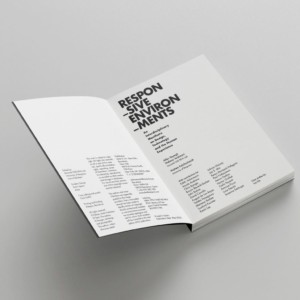
A new book from the Harvard Graduate School of Design’s Responsive Environments and Artifacts Lab (REAL), co-authored by Associate Professor in Practice of Architectural Technology Allen Sayegh, Stefano Andreani (MDes ’13), and Matteo Kalchschmidt, presents a design manifesto in response to the question: What makes an environment “responsive”?
Released by Actar Publishers, Responsive Environments: An Interdisciplinary Manifesto on Design, Technology and the Human Experience draws on years of research from REAL, design work by Cambridge-based research studio INVIVIA , and other innovative practices. It examines our “technologically-mediated relationship with space” and is divided into three parts: Situations, Experiences, and Interactions. For each section, the book includes a series of case studies.
REAL is dedicated to a “design-led approach for the development of alternative models, technologies, and processes to be applied to artifacts and buildings as well as to cities and landscapes, with the ultimate objective of mediating and augmenting the relationship between the individual and the urban environment.” Sayegh serves as principal investigator and Andreani is the lab’s research associate and project manager.
Browse and buy the book on Actar’s website.
First Comprehensive Assessment of HouseZero Demonstrates High Energy Efficiency
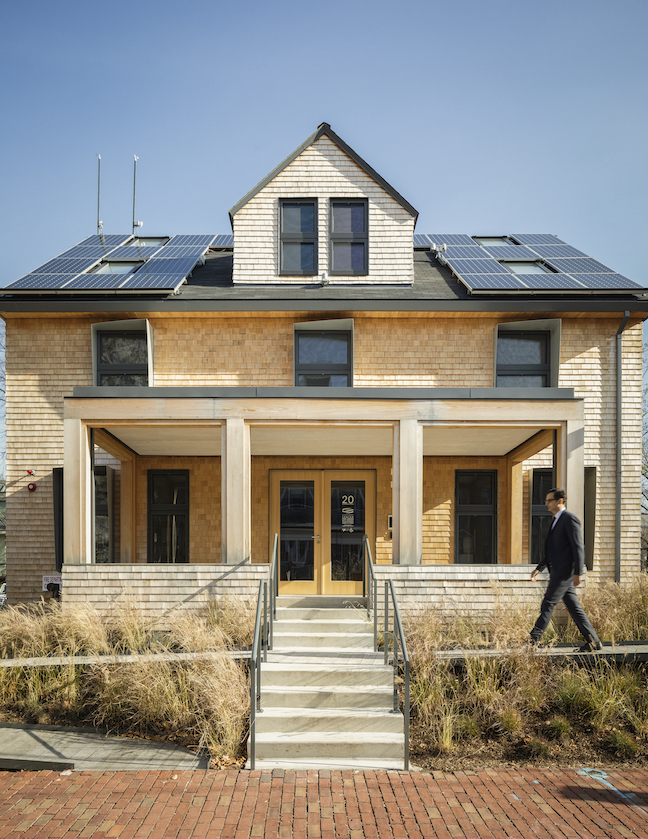
Newly published research in the peer-reviewed journal Energy and Buildings shows that the Harvard Center for Green Buildings and Cities’ HouseZero achieves a high level of energy efficiency with a combination of natural ventilation and a thermally active building system (TABS). With TABS, water flowing through pipes embedded in reinforced concrete is used to heat or cool a building, minimizing temperature fluctuations. A year-long assessment of the building’s ventilation and TABS presents the first comprehensive look at HouseZero’s energy efficiency.
“The research supports the effectiveness and success of [HouseZero’s] integrated system configurations and control strategies,” writes the Harvard Center for Green Buildings and Cities in a press release . “Specifically, the data demonstrates that the natural ventilation and TABS integration can effectively control the indoor thermal environment while achieving high energy efficiency. This is also reflected by the low annual energy consumption for heating and cooling described in the paper.”
HouseZero—which functions both as the headquarters for the Harvard Center for Green Buildings and Cities and as an experimental laboratory—was unoccupied during the first year of data collection due to the pandemic. But the research contains valuable information about the building’s performance and will help to inform strategies to minimize gaps between design intents and building operation. It also includes a set of takeaways that can be applied to retrofitting and operating similar structures.
“Comprehensive Assessment of Operational Performance of Coupled Natural Ventilation and Thermally Active Building System via an Extensive Sensor Network” is co-authored by Bin Yan, Xu Han, Ali Malkawi, Tor Helge Dokka, Pete Howard, Jacob Knowles, Tine Hegli, and Kristian Edwards and appears in Volume 260 of Energy and Buildings (1 April 2022).
Toni L. Griffin Honored with Edmund N. Bacon Urban Design Award from Center for Architecture and Design

Toni L. Griffin, professor in practice of Urban Planning and Publics Domain head, is the 2022 recipient of the Edmund N. Bacon Urban Design Award . Given by Philadelphia’s Center for Architecture and Design , the award recognizes professionals who have made significant contributions to the field of urban planning through expert articulation of vision, communication, and improvement in their communities. Griffin joins an impressive legacy of Edmund N. Bacon Urban Design Award recipients, including Theaster Gates (LF ‘11), Denise Scott Brown, and Paul Goldberger.
Griffin was selected as this year’s recipient for her focus on design justice in the built environment. A central question in her work asks, “Would we design better places if we put the values of equality, inclusion, or equity first?” A press release from the Center also acknowledged Griffin’s alignment with “conversations the Center is having about the future of our student design competition and how we can use it to help students become better designers with an ubiquitous lens of equity, inclusion and justice in their approach to urban design, planning and architecture.”
Griffin’s firm, New York-based urbanAC , consults on planning and design revitalization projects with a focus on “historical and current disparities involving race, class, and generation.” Cities Griffin and urbanAC have had their hand in include Chicago, St. Louis, Philadelphia, Pittsburgh, Milwaukee, Memphis, and Detroit.
A graduate of the Loeb Fellowship Class of 1998, Griffin’s work to address, define, and stimulate the just city carry over to her engagements at the GSD. This semester, you can find her teaching “The Gentrification Debates: Perceptions and Realities of Neighborhood Change,” a seminar exploring the causes and effects of gentrification on national and city-specific scales. She is also the founder and director of the Just City Lab , a Harvard-based research center investigating the ways design can have a positive impact on addressing the conditions of injustice in cities.
Griffin will be honored in person and online and will give a talk at the Edmund N. Bacon Urban Design Award ceremony on March 24, 2022, in Philadelphia. Registration for the Zoom and in-person ceremony is required.
Stoss Landscape Urbanism Receives AIA Regional & Urban Design Award for Suffolk Downs Master Plan
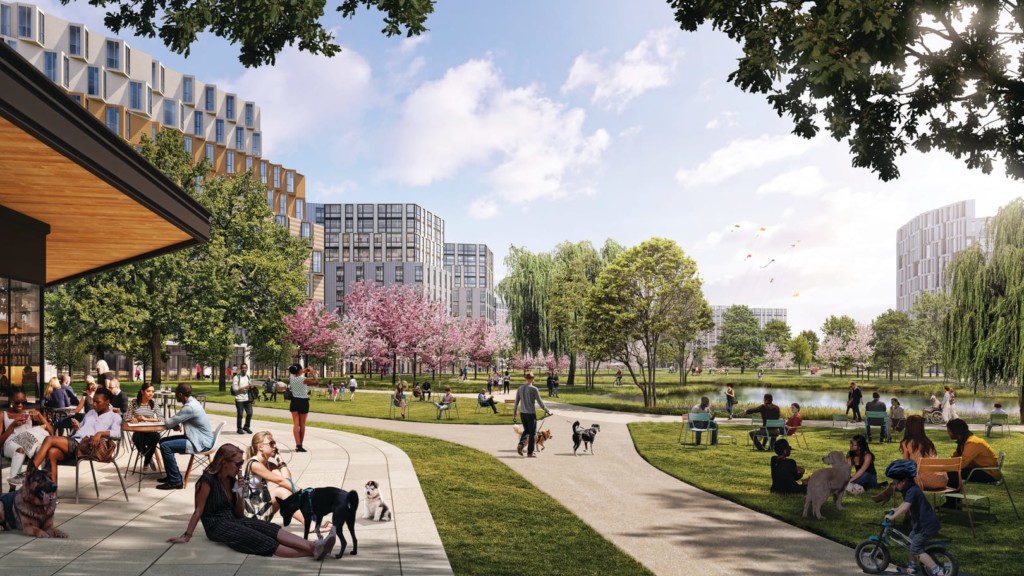
Stoss Landscape Urbanism , the design studio founded by Professor in Practice of Landscape Architecture Chris Reed, has received a 2022 AIA Award for Regional & Urban Design for the Suffolk Downs Master Plan. The annual AIA honors recognize “the best buildings and spaces—and the people behind them.”
Stoss received the award in partnership with Boston architecture firm CBT . The plan for the former horse racing facility in East Boston would create a highly resilient, mixed-use neighborhood oriented around transit. Studio director in the Boston office of Stoss and Design Critic in Landscape Architecture Amy Whitesides (MLA ’12) served as the director-in-charge for the project, with Reed acting as design director.
In addition to earning the AIA award, work by Stoss is featured as the cover story in the February 2022 publication of Landscape Architecture Magazine . The article reports on the design of a new central quad at the University of Michigan’s North Campus.
Reed also recently participated in an interview with the Canadian magazine Landscapes | Paysages , speaking with Snøhetta’s Michelle Delk and Dialog’s Doug Carlye about the future of landscape architecture. Asked to give advice for the new era, Reed says: “Embrace the challenges. Embrace the complexity. Don’t put it aside. And then find your own obsession, your own parallel obsession, and keep at that, too. Find your creative medium.”
Grace La and James Dallman Appointed First GSD Graduate Commons Program Faculty Directors
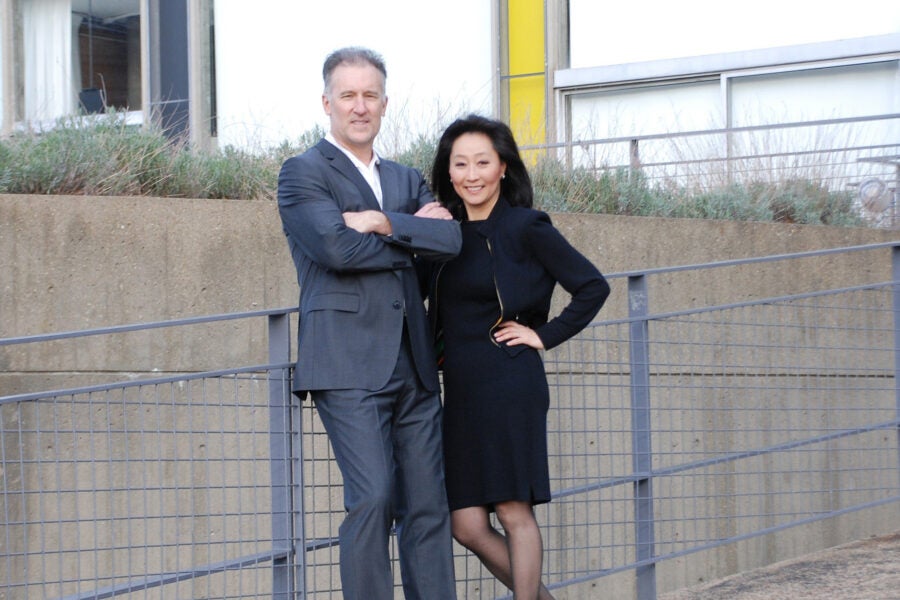
Grace La, professor of architecture and chair of the Practice Platform, and her husband, James Dallman (MArch ’92), have been appointed the newest faculty directors as part of Harvard’s Graduate Commons Program (GCP) . They are the first couple from the GSD to serve in the role, in which they will direct interdisciplinary, university-wide programs, serving as the intellectual leaders of the graduate residential communities of the GSD, HBS, FAS, and SEAS.
“We are thrilled to have our first GSD faculty directors joining us next year,” says GCP Director Lisa Valela . “In conversations with former HUH residents and interns, we learned that Grace and James share a commitment to mentoring and supporting graduate students.”
The couple will become the leaders of 10 Akron Street beginning in the fall of 2022. “James and I are delighted to join the distinctive GCP program, which enables us to contribute to the intellectual life at Harvard in new and expansive ways,” says La . “We look forward to collaboration across the university.” They will be joined by their two sons.
La and Dallman both hold degrees from the GSD. La graduated from Harvard College in 1992 and received her MArch from the GSD in 1995, and Dallman graduated with an MArch from the GSD in 1992. The pair are also principals and cofounders of the architecture practice LA DALLMAN .
This spring, La is leading the design research studio “Eco Folly” alongside Erika Naginski, Robert P. Hubbard Professor of Architectural History. The studio and corresponding seminar uses the folly opportunistically to create “a space of design experimentation in which participants will explore the behavior of materials, understand the life-cycle of buildings, and evaluate sustainable consequences.” The design work will be exhibited at the GSD’s House Zero this coming fall, and is generously funded by the Center for Green Buildings and Cities and the Department of Architecture.
Learn more about La and Dallman’s new leadership role in the Harvard Gazette .
New Book by Andrew Witt Examines the Visual Intersections of Architecture, Mathematics, and Culture
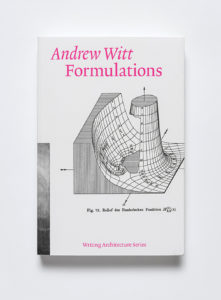
A new book by Associate Professor in Practice of Architecture Andrew Witt examines more than 150 years of seeing, drawing, and modeling architecture mathematically. It presents a rich tour of the drawing machines, geometric patterns, crystal structures, and stereoscopic images that connected modern architecture to modern science and expanded spatial imagination. The book’s research builds on the GSD seminar “Narratives of Design Science” led by Witt in past years.
Released in January 2022 by the MIT Press, Formulations: Architecture, Mathematics, Culture bridges the art of science and design. The book studies architecture’s encounter with mathematical calculation systems that were ingeniously retooled by architects for design. To illustrate initial exchanges between design and science, Witt provides a catalog of pre-digitization drawings and calculations from mid-twentieth-century mathematical practices in design. Formulations also takes up the “formal compendia that became a cultural currency shared between modern mathematicians and modern architects.”
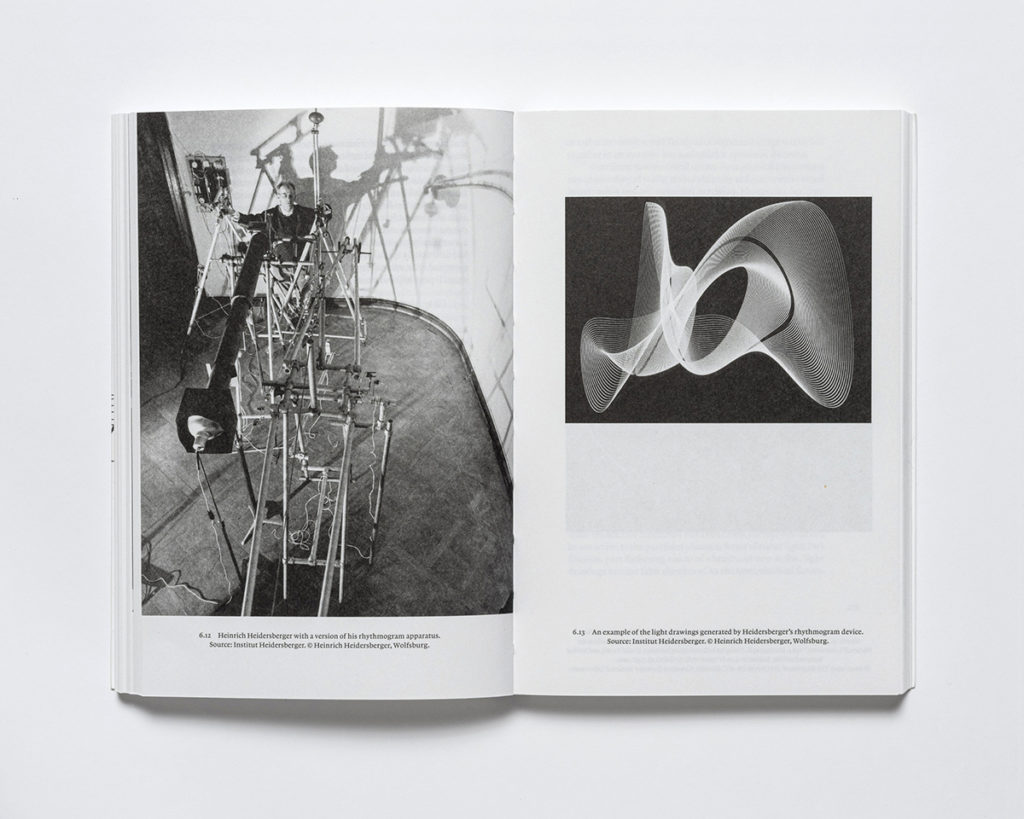
As a way of illustrating the many ways mathematics penetrated design thinking as we know it today, Formulations examines a variety of innovations, including early drawing machines that mechanized curvature, the virtualization of buildings and landscapes through surveyed triangulation and photogrammetry, and stereoscopic drawing.
Antoine Picon, director of doctoral programs and G. Ware Travelstead Professor of the History of Architecture and Technology at the GSD, describes the book as a “brilliant and thought-provoking navigation through complex mathematical notions, models and machines, spatial patterns, and construction techniques. A must-read for anyone interested in the relationships between architecture, mathematics, and digital techniques.”
Formulations is part of the Writing Architecture series, edited by Cynthia Davidson, which includes previous contributions from Harvard faculty members including Giuliana Bruno, Edward Eigen, and K. Michael Hays. It is the first book in a complete graphic redesign of the series, by graphic designer Ben Fehrman-Lee .
Trained as both an architect and a mathematician, and a graduate of the GSD’s MArch and MDes programs, Witt’s research explores the relationship between architecture, science, and visual techniques through the lens of mathematics. He is also editor of the trilogy “Studies in the Design Laboratory ,” jointly published by the GSD and the Canadian Centre for Architecture. The final installment of the series, Tange Lab: The Quantified Economy and Urban Futurism, will be available online soon.
Learn more about Witt’s Formulations from the MIT Press .
Announcing the 2022 MICD Just City Mayoral Fellowship

The Just City Lab at the Harvard Graduate School of Design and the Mayors’ Institute on City Design (MICD) are pleased to announce the launch of the 2022 MICD Just City Mayoral Fellowship, taking place in Spring 2022.
The 2022 MICD Just City Mayoral Fellowship will help mayors navigate a just and equitable recovery from the pandemic, providing actionable ideas for city leaders rising to meet this moment of change. Building on the inaugural 2020 Fellowship , this program will explore ways to create lasting, transformational impacts from new federal funding streams such as the Infrastructure Investment and Jobs Act and the American Rescue Plan Act. The Lab’s Just City Index will frame dynamic presentations and dialogues with experts in the fields of architecture, landscape architecture, urban planning, art activism, housing, and public policy. Over the semester-long program, mayors will identify how racial injustices manifest in the social, economic, and physical infrastructures of their cities and develop manifestos of action for their communities.
The 2022 MICD Just City Mayoral Fellows include Charleston, SC Mayor John J. Tecklenburg ; College Park, MD Mayor Patrick L. Wojahn ; Duluth, MN Mayor Emily Larson ; Madison, WI Mayor Satya Rhodes-Conway ; Providence, RI Mayor Jorge O. Elorza; Richmond, VA Mayor Levar M. Stoney; Salisbury, MD Mayor Jacob R. Day ; and Youngstown, OH Mayor Jamael Tito Brown .
The Just City Lab is a design lab located within the GSD and led by architect and urban planner Toni L. Griffin. The Lab has developed nearly 10 years of publications, case studies, convening tools and exhibitions that examine how design and planning can have a positive impact of addressing the long-standing conditions of social and spatial injustice in cities. The Mayors’ Institute on City Design (MICD), the nation’s preeminent forum for mayors to address city design and development issues, is a leadership initiative of the National Endowment for the Arts in partnership with the United States Conference of Mayors . Since 1986, MICD has helped transform communities through design by preparing mayors to be the chief urban designers of their cities.
“I’m delighted to see this powerful collaboration between the Just City Lab and the Mayors’ Institute on City Design continue,” says Sarah Whiting, dean and Josep Lluís Sert Professor of Architecture. “This year’s cohort of mayors come from many cities that are particularly interesting to our students as they consider their future plans. These are mostly middle-sized cities that are transforming quickly as a response to the skyrocketing costs of our nation’s largest urban centers. The Mayoral Fellowship is well-timed to help these eight mayors lead in terms of equity and opportunity. Our aspiration is that ‘just cities’ will become the standard for what we expect in this country, not the exception to what so many experience today.”
“Mayors have led our communities through a series of unrelenting challenges over the past two years. With new federal funding streams, we have a unique opportunity for once-in-a-generation change,” said Tom Cochran , CEO and executive director of the United States Conference of Mayors. “Mayors are now tasked with uniting their communities around real solutions and making transformational investments. The traditional MICD experience, with its candid, small-group format and access to national design experts, is so often transformative for mayors. There is no better model for empowering mayors to find solutions in our nation’s cities, and the United States Conference of Mayors is proud to partner with the Just City Lab to help guide mayors through this important chapter of American history.”
“Building on the National Endowment for the Arts’ vision to heal, unite, and lift up communities with compassion and creativity, we are proud and humbled to continue this important collaboration between MICD and the Just City Lab,” said Jennifer Hughes, NEA director of design and creative placemaking. “This program will take the transformative power of MICD, which illuminates the power of design to tackle complex problems, and apply it to the defining challenge of our time: ensuring equity and justice for everyone.”
On April 22, the 2022 Fellows will come together to discuss strategies for using planning and design interventions to address racial injustice in each of their cities at a GSD event hosted by Griffin. The program will be free and open to the public.
The Just City Lab and MICD are thrilled to continue this fellowship to help mayors shape more just cities. Learn more about the host organizations at www.micd.org and www.designforthejustcity.org .
Parts of this press release also appeared on the MICD website .
Jordan Weber, Germane Barnes, Design Earth Named 2022 United States Artists Fellows
Fellows and graduates of the Harvard Graduate School of Design are among the 63 recipients of 2022 USA Fellowships from national arts funding organization United States Artists (USA). Now in its 17th year, USA Fellowships provide recipients with an unrestricted $50,000 award to support their creative and professional development.
According to the United States Artists’ announcement , “The 2022 USA Fellows were selected for their remarkable artistic vision and their commitment to community—both within their specific regions and discipline at large.” They represent 23 states and Puerto Rico and span 10 artistic disciplines, including Architecture & Design.

Regenerative land sculptor and environmental activist Jordan Weber was honored with a fellowship in the Visual Arts category. He is the inaugural joint Loeb/ArtLab artist in residence , a collaborative program intended to enrich the Loeb Fellowship experience with studio space in the ArtLab and access to resources from the ArtLab community. This fall, “Perennial Philosophies ,” a public artwork by Weber commissioned by the Harvard University Committee on the Arts (HUCA), was unveiled on the grounds of the ArtLab. The sculpture responds to the dual pandemics of 2020—COVID-19 and racial injustice—and features an excerpt from “The Hill We Climb,” the poem written by Harvard graduate Amanda Gorman for President Biden’s inauguration.


Architecture & Design fellowship winner Germane Barnes leads Miami-based research and design practice Studio Barnes . His 2021 Wheelwright Prize–winning project, Anatomical Transformations in Classical Architecture, examines Roman and Italian architecture through the lens of non-white constructors. Barnes is also the recipient of a 2021-2022 Rome Prize in Architecture and a 2021 Architectural League Prize.
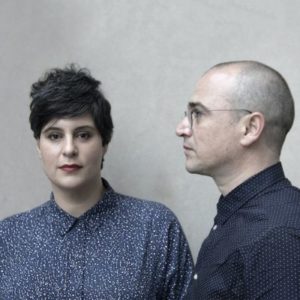
Cambridge-based research practice Design Earth was founded in 2010 by Rania Ghosn and El Hadi Jazairy (both DDes ’10) and honored with a USA Fellowship in the Architecture & Design category. The pair are founding editors of the GSD journal New Geographies and edited the “Landscapes of Energy” and “Scales of the Earth” issues. Ghosn and Jazairy are also associate professors of architecture at the Massachusetts Institute of Technology and the University of Michigan respectively.
The practice of 2020 Design Critic in Architecture Jennifer Newsom, Dream The Combine, which Newsom founded with Tom Carruthers, was also recognized with a USA Fellowship in the Architecture & Design category. Newsom led the fall 2020 option studio “Movements” at the GSD. Read an interview with Newsom on foregrounding the kinetic body in architectural representation.
In 2021, GSD professor Jennifer Bonner (MArch ’09) and Spring 2021 Senior Loeb Scholar Walter Hood received USA Fellowships. Other past recipients include 2019 GSD Class Day speaker Teju Cole (2015) and Johnston Marklee, the practice of GSD professors Sharon Johnston and Mark Lee (2016).